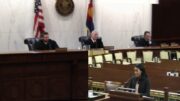In a five-page white paper that we published last July, CFOIC President Steve Zansberg examined how the electronic communications of public employees – emails, texts and social media messages – are treated under the Colorado Open Records Act (CORA).
Zansberg recently expanded on this topic, looking at it from a national perspective, in an article for Communications Lawyer, a publication of the American Bar Association. Zansberg, a media law and First Amendment attorney, recently chaired the ABA’s Forum on Communications Law.
Because of new technologies, he notes in the Communications Lawyer article, governments are generating more information on a daily basis than ever before. Yet, “communications and data storage technologies have simultaneously raised new barriers to citizens’ ability to inspect those records under freedom of information laws.”
So we’ve seen, for instance, Florida Gov. Rick Scott and his staff using private Gmail accounts to circumvent the state’s public records law. In Pennsylvania, the secretary of education acknowledged that her employees “delete and cleanse” emails every night. In Colorado, the legislature’s policy is “to delete all e-mail within thirty days after you have received or sent it, unless there is an overriding reason to retain it for longer than thirty days.”
Zansberg’s article examines who controls the electronic communications of government, whether they are considered public records and how long those records must be retained. It also discusses access to other types of digital information, including information kept in databases and whether the public is entitled to those records in the same format in which they are maintained by the government.
Download “Cloud-Based Public Records Pose New Challenges for Access” by Steve Zansberg.
Follow the Colorado Freedom of Information Coalition on Twitter @CoFOIC. Like CFOIC’s Facebook page. Do you appreciate the information and resources provided by CFOIC? Please consider making a tax-deductible donation.





